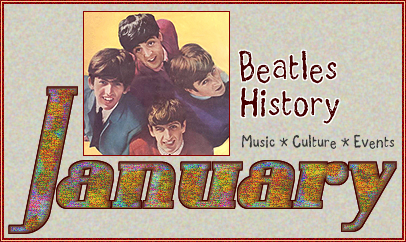 History offers History offers
a chance
to truly
understand
how the past
impacts the now.
Follow our
daily timelime
of historical
events to
discover the
role The Beatles
played in changing
the modern world.
THE FOLLOWING EVENTS TOOK PLACE ON JANUARY 16
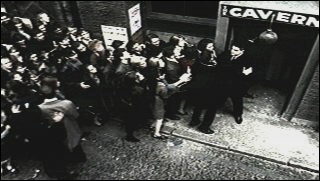 1957--The Cavern Club opens in a former wine cellar on Mathew Street in Liverpool, England. The club will earn its landmark status in 1961 and 1962 when The Beatles are its house band. 1957--The Cavern Club opens in a former wine cellar on Mathew Street in Liverpool, England. The club will earn its landmark status in 1961 and 1962 when The Beatles are its house band.
1963--The Beatles are at Granada TV Centre, Manchester, for a live appearance on the Granada Television program "People and Places." They lip-sync performances of Ask Me Why and Please Please Me for the live transmission. They also record a radio appearance on this day.
1963--The Beatles are at the Playhouse Theatre in Manchester to tape a radio appearance for the BBC program "Here We Go." The Beatles perform four songs, Chains, Please Please Me, Three Cool Cats, and Ask Me Why, but Three Cool Cats is omitted from the actual broadcast, which goes out on January 25. The Beatles' hectic schedule for the day went as follows: 3:00-4:00 p.m. rehearsing at the Granada TV Centre; 4:30-5:30 p.m. rehearsing at the Playhouse Theatre; 6:35-7:00 p.m. back at the Granada TV Centre for their live television broadcast; 8:45-9:30 p.m. back to the Playhouse Theatre for recording of the radio program.
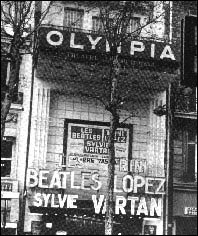 1964--The Beatles perform two shows at the Olympia Theatre, Boulevard des Capucines, Paris, France. This is the first of an 18-night engagement, spanning from January 16 through February 4 (20 nights in Paris with two nights off, January 21 and January 28). They perform two, or even three, shows each night. Exactly who the headline act was supposed to be was never particularly clear, but The Beatles did close every show, which included French singer Sylvie Vartan, US singer Trini Lopez, and six other acts. The Beatles' repertoire was From Me to You, Roll Over Beethoven, She Loves You, This Boy, Boys, I Want to Hold Your Hand, Twist and Shout, and Long Tall Sally. This first night was a disaster: The Beatles' amplification equipment broke down three times during their performance (George Harrison suspected sabotage). The first show, which was attended mostly by Paris' top society members (all dressed in formal evening attire), went over like a lead balloon. The audience was unresponsive, and The Beatles didn't like them much 1964--The Beatles perform two shows at the Olympia Theatre, Boulevard des Capucines, Paris, France. This is the first of an 18-night engagement, spanning from January 16 through February 4 (20 nights in Paris with two nights off, January 21 and January 28). They perform two, or even three, shows each night. Exactly who the headline act was supposed to be was never particularly clear, but The Beatles did close every show, which included French singer Sylvie Vartan, US singer Trini Lopez, and six other acts. The Beatles' repertoire was From Me to You, Roll Over Beethoven, She Loves You, This Boy, Boys, I Want to Hold Your Hand, Twist and Shout, and Long Tall Sally. This first night was a disaster: The Beatles' amplification equipment broke down three times during their performance (George Harrison suspected sabotage). The first show, which was attended mostly by Paris' top society members (all dressed in formal evening attire), went over like a lead balloon. The audience was unresponsive, and The Beatles didn't like them much 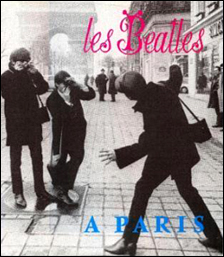 either. John Lennon recites the only line of French he knows: ”Je me leve a sept heures.” “How barbaric,” responds a fan in the front row. John later escapes the post-show melee of journalists and photographers with Daily Mail reporter Maureen Cleeve. Throughout the extended run, playing in front of predominantly male audiences (a complete contrast to what they are used to in Britain) The Beatles struggle to match their advance publicity, and to cope with the British (and French) press who is quick to capitalize on their “failure.” The French press had little good to say about The Beatles in the next day's papers, but The Beatles didn't really care, because they'd just received news that their single I Want To Hold Your Hand had hit #1 in the US, vaulting to the top spot from the #43 position it had held the previous week. It is estimated that in mid-January, I Want To Hold Your Hand was selling 10,000 copies an hour in New York City alone. Now, all of The Beatles' recordings were hitting the receptive US market at once, including re-releases of the VeeJay and Swan releases that had hardly dented the US charts in 1963. In less than a month, The Beatles would be in America, and their reputation was about to leap from mere fame to legend. either. John Lennon recites the only line of French he knows: ”Je me leve a sept heures.” “How barbaric,” responds a fan in the front row. John later escapes the post-show melee of journalists and photographers with Daily Mail reporter Maureen Cleeve. Throughout the extended run, playing in front of predominantly male audiences (a complete contrast to what they are used to in Britain) The Beatles struggle to match their advance publicity, and to cope with the British (and French) press who is quick to capitalize on their “failure.” The French press had little good to say about The Beatles in the next day's papers, but The Beatles didn't really care, because they'd just received news that their single I Want To Hold Your Hand had hit #1 in the US, vaulting to the top spot from the #43 position it had held the previous week. It is estimated that in mid-January, I Want To Hold Your Hand was selling 10,000 copies an hour in New York City alone. Now, all of The Beatles' recordings were hitting the receptive US market at once, including re-releases of the VeeJay and Swan releases that had hardly dented the US charts in 1963. In less than a month, The Beatles would be in America, and their reputation was about to leap from mere fame to legend.
1965--The Beatles put on two performances of "Another Beatles Christmas Show" at the Hammersmith Odeon in London. This is the final night of the revue.
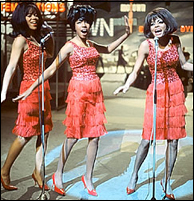 1965--The Supremes' Come See About Me knocks The Beatles' I Feel Fine off the No. 1 spot in the US. 1965--The Supremes' Come See About Me knocks The Beatles' I Feel Fine off the No. 1 spot in the US.
1969--In today’s edition of Disc and Music Echo, John Lennon is quoted as saying that Apple is losing vast quantities of money, and that The Beatles are in danger of going bankrupt unless the situation is reversed. Allen Klein reads the story with interest.
1970--Detectives from Scotland Yard converge upon the London Arts Gallery, raiding the John Lennon "Bag One" lithograph exhibit. They confiscate eight of the lithographs, those which have been deemed to be erotic and indecent. The warrant was issued under the Obscene Publications Act.
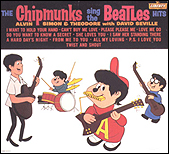
1971--George Harrison's single My Sweet Lord is #1 in the US charts for the third week in a row.
1972--Novelty maestro Ross Bagdasarian (aka David Seville) dies. He created The Chipmunks, who sang hits of the day in speeded-up voices (Ragtime Cowboy Joe and The Christmas Song). As David Seville he enjoyed a No. 1 hit in 1958 with Witch Doctor.
1975--Paul McCartney and Wings arrive in New Orleans to begin sessions for the album Venus and Mars. The band records with Allen Toussaint at his Sea-Saint Studio; the LP will be released four months later.
1976--Peter Frampton's double-length classic LP, Frampton Comes Alive! is released. Rolling Stone proclaims the disc to be "a synthesis of the best third-generation British rock styles."
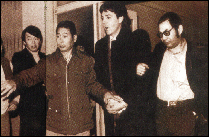 1980--Paul McCartney and Wings arrive in Tokyo, Japan, for their tour. After marijuana is found in his luggage and in the hood of one of the McCartney children’s coat, Paul McCartney is arrested for possession and the tour is cancelled. Known as prisoner No. 22, Paul spends the night in the local jail, while Linda, the kids, and Wings take up residence at the Okura Hotel. Paul is kept in jail for 10 days. The music of Wings is banned from all radio and TV stations in the country. Denny Laine is very upset at the turn of events. Later that evening in her Tokyo hotel room, Linda remarks: “It’s really very silly. People certainly are different over here. They take it so very seriously. Paul is now in some kind of detention place and I have not been allowed to see him. As soon as they get someone nice like Paul, they seem to make a field day of it! I’ll never come back to Japan again. It’s my first trip AND my last!” Some commentators on John Lennon’s career have gone so far as to allege that Yoko Ono was able to manoeuvre the arrest through long-distance calls from New York. Said Fred Seaman: “John firmly believed that Yoko had managed to cast a spell on Paul.” 1980--Paul McCartney and Wings arrive in Tokyo, Japan, for their tour. After marijuana is found in his luggage and in the hood of one of the McCartney children’s coat, Paul McCartney is arrested for possession and the tour is cancelled. Known as prisoner No. 22, Paul spends the night in the local jail, while Linda, the kids, and Wings take up residence at the Okura Hotel. Paul is kept in jail for 10 days. The music of Wings is banned from all radio and TV stations in the country. Denny Laine is very upset at the turn of events. Later that evening in her Tokyo hotel room, Linda remarks: “It’s really very silly. People certainly are different over here. They take it so very seriously. Paul is now in some kind of detention place and I have not been allowed to see him. As soon as they get someone nice like Paul, they seem to make a field day of it! I’ll never come back to Japan again. It’s my first trip AND my last!” Some commentators on John Lennon’s career have gone so far as to allege that Yoko Ono was able to manoeuvre the arrest through long-distance calls from New York. Said Fred Seaman: “John firmly believed that Yoko had managed to cast a spell on Paul.”
1981--UK release of the John Lennon / Yoko Ono single Woman / Beautiful Boys (Geffen).
1981--Yoko Ono dispatches Fred Seaman off to England to deliver a copy of the Woman promotional film to the BBC for transmission on the next edition of BBC1’s “Top Of The Pops.” The clip, version one, is broadcast once only on Thursday, January 22, on BBC1 and is immediately brought back to Yoko in New York. Seaman also has with him on his journey to England, copies of John’s personal diaries between 1976 and 1980 to be presented, in accordance with John’s will, to his son, Julian.
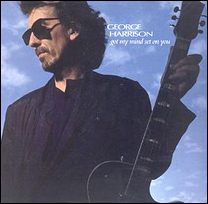 1985--On the 15th anniversary of their seizure, eight explicit lithographs by John Lennon, which were confiscated by police from the London Arts Gallery in 1970, are put on display in Liverpool’s Beatle City Museum. The drawings, part of a collection of 14 called “Bag One,” show John and Yoko on their honeymoon in 1969, engaging in various acts of lovemaking. 1985--On the 15th anniversary of their seizure, eight explicit lithographs by John Lennon, which were confiscated by police from the London Arts Gallery in 1970, are put on display in Liverpool’s Beatle City Museum. The drawings, part of a collection of 14 called “Bag One,” show John and Yoko on their honeymoon in 1969, engaging in various acts of lovemaking.
1988--George Harrison's single Got My Mind Set On You is #1 in the US charts.
1992--In Hollywood, Mick Jagger attends the premiere of his new movie, “Freejack.” Leonard Maltin describes the sci-fi thriller as "tiresome, superficial fare."
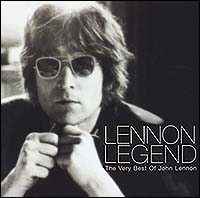 1998--Postponed from December 16 last year, BBC2 finally transmits the Yoko Ono “O Zone” special. During the 20-minute program, used as further promotion for the album Lennon Legend and subtitled “The Ballad of John and Yoko,” Yoko discusses a wide range of subjects, including the break-up of The Beatles and John’s songwriting. Yoko uses this opportunity to hit back at Paul McCartney for some of the things he said in his book, "Many Years From Now." Over his claim that he was the leader of The Beatles, Yoko says: “I know Paul thinks he was leading, or something like that. The way John led the band was very high level, on some kind of magical level. Not on a daily level like Paul said. John did not make the phone calls. John was not on that level of a leader. He was on a level of a spiritual leader. He was the visionary and that’s why The Beatles happened.” She also responded to Paul’s claim that he helped to get John and Yoko back together in January 1975. “Let him say whatever he wants to say. If he wants to get credit about it, why not? That’s fine. I know it wasn’t true. He’s put in a position of being Salieri to Mozart. And it’s sad. Because John passed away, people naturally have this strong sentiment towards him. It’s a high price to pay for Paul to be in the same position as John.” 1998--Postponed from December 16 last year, BBC2 finally transmits the Yoko Ono “O Zone” special. During the 20-minute program, used as further promotion for the album Lennon Legend and subtitled “The Ballad of John and Yoko,” Yoko discusses a wide range of subjects, including the break-up of The Beatles and John’s songwriting. Yoko uses this opportunity to hit back at Paul McCartney for some of the things he said in his book, "Many Years From Now." Over his claim that he was the leader of The Beatles, Yoko says: “I know Paul thinks he was leading, or something like that. The way John led the band was very high level, on some kind of magical level. Not on a daily level like Paul said. John did not make the phone calls. John was not on that level of a leader. He was on a level of a spiritual leader. He was the visionary and that’s why The Beatles happened.” She also responded to Paul’s claim that he helped to get John and Yoko back together in January 1975. “Let him say whatever he wants to say. If he wants to get credit about it, why not? That’s fine. I know it wasn’t true. He’s put in a position of being Salieri to Mozart. And it’s sad. Because John passed away, people naturally have this strong sentiment towards him. It’s a high price to pay for Paul to be in the same position as John.”
For more day-by-day history go to HistoryUnlimited.net
|
 History offers
History offers


